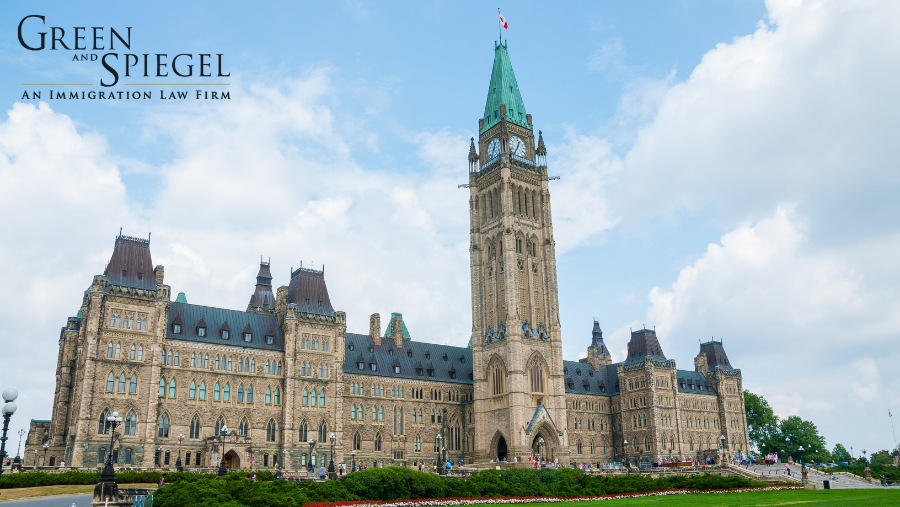
With the new year upon us, our team has put together a list of eight Canadian immigration developments likely to emerge in 2024.
1. Stable Immigration Targets
Every non-election year, the government of Canada is required to release its immigration targets on the number of permanent residents that will be admitted to Canada for the following years under each of the three immigration classes: economic, family, and humanitarian. Following the trajectory of the 2023-2025 Plan, Canada aims to welcome 485,000 new permanent residents in 2024, which is slightly increased from 2023’s target of 465,000. Of this 2024 target, 58 percent will enter under the economic class, 24 percent under the family class, and 19 percent under the humanitarian class.
2. Addressing Labour Shortages
The government of Canada continues to maintain high immigration targets due to a national shortage of skilled labour, an aging population, and a low birth rate. In fact, Statistics Canada estimates that 98% of Canada’s population growth comes from newcomers. At the same time, Canada is currently coping with an affordability, healthcare, and housing crisis, which has led to shifting public perception against immigration.
To balance these realities, and to support a strong and robust economy, Canada will continue to prioritize high immigration levels in 2024, with an emphasis on attracting and retaining immigrants with in-demand skills and qualifications, such as healthcare, manufacturing, engineering, the trades, transportation, and agriculture. This includes the following measures:
- Category-based draws in Canada’s Express Entry system, which targets specific skills and qualifications;
- Developing regional programs, such as the Atlantic Immigration Program and the Rural and Northern Immigration Pilot, which address local labour market needs;
- Developing unique programs intended to provide a pathway to permanent residence for individuals in Canada with specific in-demand skills, such as construction workers who can aid in building new homes, or agricultural workers;
- Development of the Recognized Employer Pilot (REP) program, which offers a streamlined approach for employers who regularly access the TFW Programto fill in-demand positions in specified occupations;
- Continuing to improve the Start-Up Visa Program, which brings foreign entrepreneurs and business to Canada;
- Introducing new measures to better transition international students to the labour force;
- Working with partners to improve foreign credential recognition.
3. Prioritizing Francophone Immigration
According to IRCC’s Strategic Report, 2024 will see the development of an ambitious new Francophone Immigration Policy to enhance the vitality of Francophone minority communities in Canada and work toward restoring and increasing their demographic weight. As part of this plan, Canada is looking to welcome 26,100 French-speaking permanent residents outside of Quebec in 2024.
Other efforts to increase Francophone immigration include the expansion of the Francophone Mobility Program, as well as the French language proficiency category-based draw in the Express Entry system. We anticipate that 2024 will likely see IRCC developing more programs and pathways to attract Francophone immigrants to all regions of Canada.
4. Embracing Technology
After years of backlogs and processing delays, we anticipate that 2024 will see the government of Canada continuing to embrace technology to increase processing capacity and efficiency for immigration applications. We anticipate that online applications will altogether phase out paper-based applications, and that IRCC will work to transform their administrative efficiencies, such as client-facing tools and service delivery channels. We anticipate that a new digital platform will be unveiled by IRCC, which will bring with it new capabilities, such as an online window into immigration programs, enhanced automation, digital self-services, and more accessible up-to-date information on the status of pending applications.
We also anticipate that IRCC will continue to incorporate advanced analytics tools and artificial intelligence into immigration decision-making, such as document and identity verification, risk assessment, fraud prevention, and streamlined application processing.
5. Parents and Grandparents Sponsorship Program
Canada allows individuals to sponsor their parents and grandparents to become permanent residents through the Parents and Grandparents Program (“PGP”). Under the PGP, Canada issues invitations to apply to individuals who have formally submitted an interest in entering their names into the lottery system. However, due to a large backlog in applications that accumulated throughout the COVID-19 pandemic, Canada has not accepted new interest-to-sponsor forms since the fall of 2020.
Although the details of the PGP program have not yet been announced for 2024, after three years of pausing new applications, we anticipate that IRCC will likely open the lottery pool to new applicants later this year. According to the current immigration levels plan, IRCC plans to welcome 32,000 parents and grandparents through the sponsorship program in 2024.
6. International Student Program Reforms
As of January 1, 2024, the cost-of-living financial requirement for study permit applicants has been raised. For 2024, a single applicant will need to show they have $20,635 available to them, in addition to their first year of tuition and travel costs. Moving forward, this threshold will be adjusted each year when Statistics Canada updates the low-income cut-off (LICO). Although intended to ensure international students have enough funds to cover the cost of living while studying, Canada recognizes that the impact of this change could vary depending on the applicant, and intends to implement targeted pilots in 2024 that will help underrepresented cohorts of international students pursue their studies in Canada.
Additionally, ahead of the September 2024 semester, Canada is planning to take measures, including limiting visas and adopting a “recognized institution” framework, to ensure that designated learning institutions provide adequate student supports, including housing, as part of the international academic experience.
In addition to the above, international students should also take note of the following changes for 2024:
- In order to prevent fraud, post-secondary designated learning institutions are now required to confirm every applicant’s letter of acceptance directly with IRCC;
- The waiver on the 20-hour-per-week limit on the number of hours international students can work off campus while class is in session has been extended to April 30, 2024;
- The facilitative measure that allows international students to count time spent studying online towards the length of a future post-graduation work permit, as long as it constitutes less than 50% of the program of study, will continue for students who begin a study program before September 1, 2024. This measure will no longer apply to students who begin a study program on or after that date;
- The temporary policy which provided an additional 18-month work permit to post-graduation work permit holders will not be extended into 2024.
7. Citizenship for Second-Generation Children Born Abroad
We will also likely see changes to Canada’s Citizenship Act in 2024.
In December 2023, the Superior Court of Justice in Ontario decided in an important ruling that the “second-generation cut-off” rule at section 3(3)(a) of the Citizenship Act is unconstitutional, and after a six-month period of invalidity, will be of no force and effect. This rule, which prohibits Canadian citizens born abroad from passing Canadian citizenship on to their children automatically if their children are also born abroad, will likely be repealed by the federal Government in the first half of 2024, unless the government chooses to appeal the court decision. This means that second-generation children born abroad may have a pathway to automatic Canadian citizenship beginning in 2024.
8. Special Programs
Over the past several years, Canada has introduced numerous temporary immigration measures to assist those affected by humanitarian crises across the globe. Foreign nationals from Afghanistan, Ukraine, Iran, Hong Kong, Turkiye, Syria, Israel, Gaza and Sudan have all been eligible for these special immigration measures for temporary and permanent residence to Canada. It is expected that IRCC will continue to respond to global humanitarian crises in 2024.
The landscape of Canadian immigration is continuously evolving, influenced by various factors such as policy changes, economic trends, and global events. In order to stay up to date on these changes, and to discuss the various immigration options that might be available to you, your family, or your business, we invite you to contact us for more information.
If you are interested in learning more what Canadian immigration in 2024 looks like, join our Green and Spiegel Inside Immigration Webinar on February 14, 2024, with speakers Stephen Green and Sonia Sidhu.







